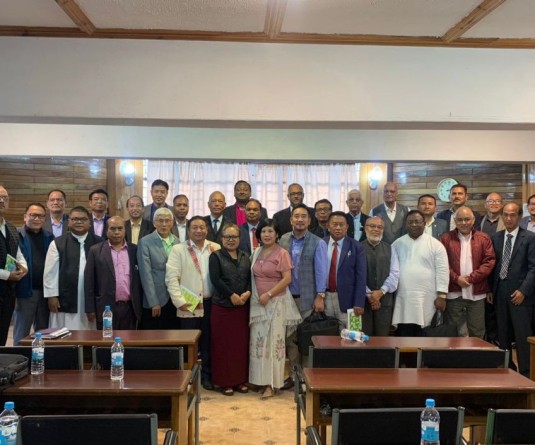
Imti Ozukum
NIEPA, New Delhi
Not being sovereign is often the foregone conclusion agreed upon by almost anyone and everyone contemplating the prospect of peace and progress in Naga society today, while the notion that sovereignty will usher in peace and progress is a notion that is seldom questioned, much less answered.The notion that sovereignty will bring peace and progress seems to be grounded in an assumption that “Indian occupation” and “not being sovereign” is the sole impediment to peace and progress while tacitly absolving the Nagas of any deficiencies of their own. The continuous assertion that sovereignty is a prerequisite has itself become the impediment by giving an incentive to postpone any serious and achievable effort to bring peace and progress. The reason for such assertion could be that it is of self-interest of certain people to maintain the status quo or simplyan exhibition of poor reasoning and comprehension ability- both are plausible.Postponing peace and progress until sovereigntyhas made Nagas comparable to a ship captain whoendlessly waits for the wind direction to change instead of adjusting the sail and sailing forward.
We can neither blame deplorable road condition on not being independent nor the lack of commerce and trade for want of separate flag when non-locals seems to be doing better business than the locals with all the limitation of working in a protected area.Hundreds if not thousands of non-nagas residing and conducting successful business in Nagaland have also ignited resentment in some quarters often stroking the narrative of “stealing” jobs and work opportunity from the locals. A simple introspection may make us realize that they created an avenue where there was none in the first place and created an opportunity for themselves while we sat clueless with a brand new degree in hand.Questions about economic development or the lack of it need to be answered empirically not just morally and emotionally. Internal conflicts can be hardly blamed on outside agents and how much of progress is hindered by such situations also needs to be answered empirically. Sovereignty will not come with a magical spell that will instantaneously erase all the political and tribal conflicts andit is notunreasonable to expectthat it could escalate. Sovereignty is not even a guarantee for social and economic development which should be clear from the fact that the state of Nagaland itself has GDP per capita higher than some of the sovereign countries in the world.
While no one disputes the importance of preserving our cultural heritage, to imagine that our culture and identity is at a risk of obliteration may be somewhat exaggerated and counterproductive when sizable resources and effort are invested in reviving culture yet skilling and developing human capital that would actually contribute in progress remains a priority that is added in the list only if there is any space left. The fear of losing cultural, ethnic and religious identity usually invokes protectionist policies whether such fear is substantiated or not and off limits ourselves into a corner resulting in social, cultural, economic and political isolation andself-marginalization.Clinging on to cultural and religious dogmas and fencing ourselves in our own cultural vanity and identity could be counterproductive because progress so far is achieved by adaptation of better cultural practices that brought changes that we all can agree is better than how our ancestors had it.
On the other side, call for observance of fasting and prayer by churches may be a good act of solidarity but unless practical and doable blueprint is drawn to fix the problem simply praying and hoping for a miracle is a waste of time and energy. Placing high hope in prayer has also actually disincentivised the need for taking action by detaching and placing the responsibility of performing and taking action on God and overflow of such sentiment can be heard even from educated people who think that solution to Naga issue lies in repenting and seeking forgiveness from God. Clearly the devil is in the detail but the detail has been packed off wholesale to be taken cared by God. Rumors of satanic worship and Christians converting to Hindu or Islam seems to elicit concern and urgency more serious than issues such as corruption and unemployment, and this could be another indication of a misplaced priority among the people whose faculty of reason is largely informed by religious tenet.
Indulgence in religious and cultural vanity must be tested against the cost it incurs on the society in the long run because such indulgence could limit receptivity towards advances from outside and encourage behaviors not conducive for progress and growth.Expanding our cultural universe by interacting and absorbing new ideas and practices from other cultures is not only desirable but a requirement if we are genuinely concern about progress and development.
Not being sovereign should not be an excuse to postpone peace and progress when the reason for such obstacle could lie somewhere else. All these does not mean that sovereignty should be demoted on the priority list but that such pursued should be guidednot by irrational beliefs and dogmas but by reason and by being pragmatic. Well, to “emerge as a key player in the new environment of the global economy”, as said by the Chief Minister of Nagaland Neiphiu Rio, is not going to be easy even with sovereignty when many of the educated youth in Nagaland possess skills, knowledge and aspiration that does not take them beyond government job. Getting independent is not going to instill automatically skills, knowledge and attitude like that of the enterprising Marwaris who have acquired such skills and knowledge through generations of diligent practice.




